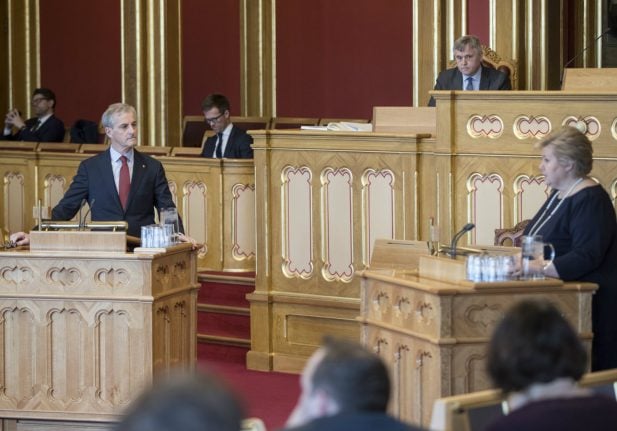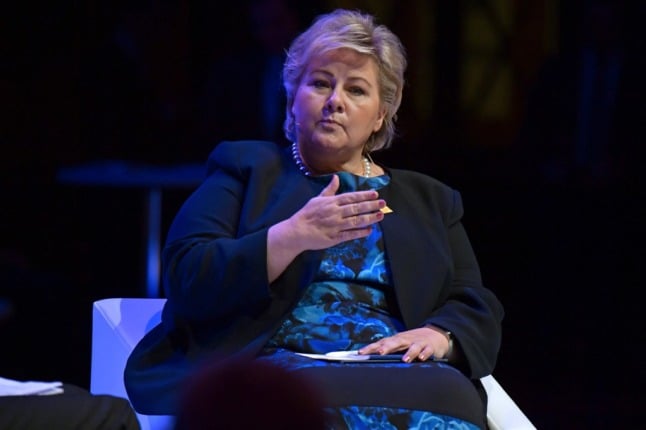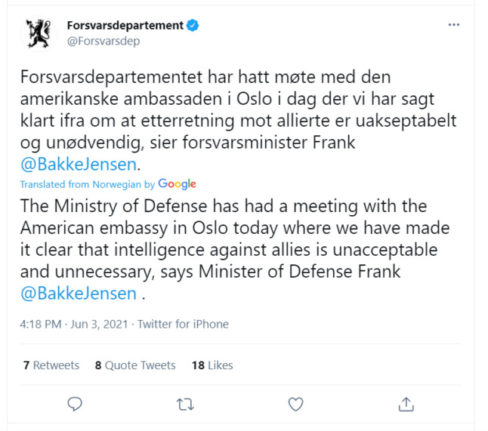Støre claimed that Solberg “had not understood what the debate is about” and that the controversial Facebook post that saw Listhaug depart her post was “not just unfounded, but dangerous”, NRK reports.
Listhaug resigned as Norway's Minister of Justice on Tuesday morning following a motion of no confidence against her by opposition parties.
The resignation was the culmination of political and public outcry over an image and message posted by Listhaug on Facebook on March 9th in criticism of Labour's opposition to a proposal to strip Norwegian citizenship from individuals considered a security threat without a court order.
In the controversial social media post, which contained a photo of al-Shabaab militants, she accused Labour of considering that “the rights of terrorists are more important than the security of the nation”.
Labour members were the main victims of the deadliest attacks on Norwegian soil since the Second World War when, on July 22nd, 2011, Anders Breivik killed 77 people in twin attacks: one targeting then Labour prime minister Jens Stoltenberg's office in Oslo and another against a Labour youth camp on the island of Utøya.
Although the former justice minister’s resignation averted a potential government collapse, the debate continued on Wednesday.
During parliamentary questions on Wednesday morning, Støre challenged Solberg on what she thought was the essence of the outcry that has dominated Norwegian political discourse over the last two weeks.
“We are once again left with a warning from the prime minister to conduct a professional and decent debate, but this is about something else. The reason I say this is dangerous is because I know people who are now hiding and are scared,” Støre said.
“The prime minister must say ‘yes, this is dangerous’. We have to recognise that statements like [Listhaug’s] are dangerous, otherwise we have not learned anything. We must learn the significance of what is kindled by dangerous opinions,” Støre said.
The Labour leader denies attributing specific opinions to Listhaug – something the outgoing minister appeared to suggest in her resignation statements.
But Støre criticised Solberg for only calling for reasonable and decent debate, rather than directly criticising Listhaug’s claim that Labour was more concerned about the rights of terrorists than of the Norwegian population.
“Does Solberg not understand that this use of words and imagery is dangerous and designed to kindle dangerous opinions?”, Støre said.
Solberg responded that she had already rejected the original statement made by Listhaug.
“I rejected it a long time ago. I gave a very clear message as long ago as Sunday that I felt the [Facebook] post was over the line of what I see as decent behaviour,” Solberg said.
The PM added that Støre was attributing to Listhaug an agenda she did not have.
“The post should not have been published, but Støre is suggesting between the lines that Sylvi Listhaug intended to agitate opinions like these. That is incorrect, and he should not be attributing this to her,” she said.
Audun Lysbakken, leader of the Socialist Left party, said during the parliamentary questions that he also felt that Solberg had not understood the core issue of the discussion relating to the social media controversy.
Lysbakken called for the prime minister to clearly state the danger of using “the language of extremists”, rather than say that many people had been hurt by Listhaug’s words or refer to what her intentions were.
“I completely agree that it is dangerous to use the language of extremists,” Solberg returned.
The PM encouraged all politicians to avoid adding to conspiracy theories.
“I have no issue with saying that we must take care that our language does not ignite any conspiracy theories,” she said.
READ ALSO:




 Please whitelist us to continue reading.
Please whitelist us to continue reading.